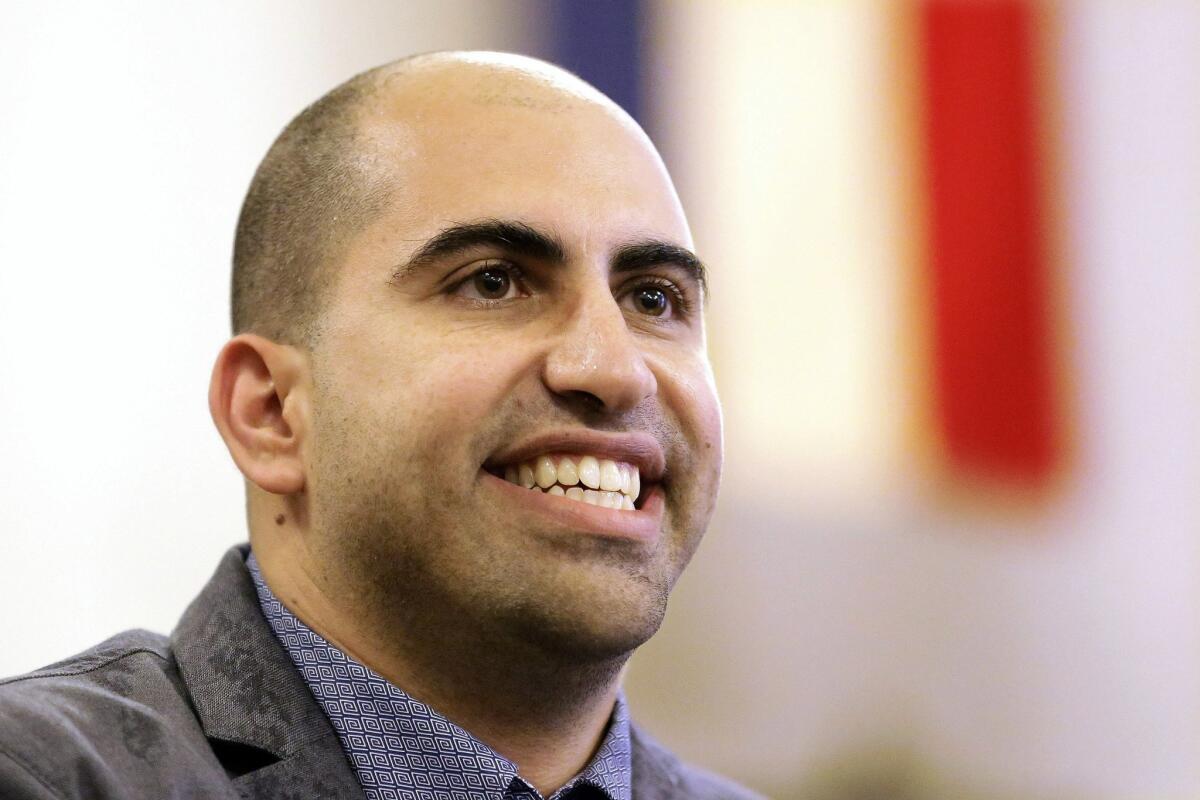A blow for academic freedom in a 1st Amendment case -- one year late

One step closer to vindication? Steven Salaita, a professor who lost a job offer from the University of Illinois over anti-Israel Twitter messages, speaks during a news conference in Champaign, Ill., on Sept. 9, 2014.
- Share via
Believers in the causes of academic freedom and free speech will undoubtedly recall the case of Steven Salaita, a respected scholar who was hired for a tenured faculty position at the University of Illinois and then, after he tweeted intemperately about Israel’s conduct in Gaza, summarily fired.
The case erupted almost exactly one year ago. Salaita just last week was assured of his day in court against the university, thanks to a blistering ruling by U.S. District Judge Harry D. Leinenweber of Chicago. Leinenweber cleared Salaita to pursue his claims that the university breached its contract to hire the scholar; in context, he found implicitly that university officials lied about the terms of his employment deal in their desperation to keep him off campus. Those officials now stand accused of the basest sophistry and dishonesty.
Let’s briefly recap the case, which I covered at the time. Salaita was hired from a secure position at Virginia Tech to join the American Indian studies program at Illinois. Then came Gaza. Salaita, whose work includes books decidedly critical of Israel, including the 2011 “Israel’s Dead Soul,” joined the debate over that conflict via very strongly worded tweets. Among them: “At this point, if Netanyahu appeared on TV with a necklace made from the teeth of Palestinian children, would anybody be surprised?” And: “Zionists, take responsibility: if your dream of an ethnocratic Israel is worth the murder of children, just ... own it already.” His Twitter feed is here.
Facing pressure from major donors and others, University Chancellor Phyllis Wise reneged on Salaita’s contract. At least, that was his position. Wise and other university officials maintained that Salaita’s appointment was always conditioned, as are all appointments, on formal approval by the board of trustees. Wise decided not to recommend his appointment to the board, which duly voted not to hire him, so he wasn’t fired (which would have been tantamount to punishing him for his speech) but merely not-hired.
Leinenweber made short work of that argument. He noted that Salaita’s moving expenses had been paid, he was welcomed to campus, and his first-semester classes scheduled. His appointment was publicly announced, and he was referred to as an “employee” in the media. “The university cannot argue with a straight face that it engaged in all these actions in the absence of any obligation or agreement,” he said in his ruling. He sided with Salaita in finding that the board’s vote was a mere formality and that the terms of his hiring were “about as unambiguous as they could be.”
Indeed, he ruled, given that the board doesn’t meet until after the academic year has begun, under the university’s claim “the entire American academic hiring process as it now operates would cease to exist, because no professor would resign a tenure position, move states, and start teaching at a new college based on an ‘offer’ that was absolutely meaningless until after the semester already started.”
The judge had little respect for Chancellor Wise’s argument that the university didn’t object to Salaita’s viewpoint so much as his lack of “civility,” which she implied would make it impossible for him to conduct decorous classes. As I observed last year, “civility” is a weasel word commonly used as a diversion by people who want to quash viewpoints they don’t like. Leininweber merely cited the Supreme Court, which in 1971 “warned of the dangers inherent in punishing public speech on public matters because of the particular words or tone of the speech.”
The judge’s ruling doesn’t assure Salaita of victory; he still has to make his case at trial. But it’s a major embarrassment for Wise, who came under intense criticism from academic groups over the Salaita case and who resigned the very day of the federal court ruling. Now she’s in hot water over her use of a personal email account to hide discussions of university affairs -- including the Salaita case -- from the public, allegedly in violation of state law. A $400,000 bonus she was awarded upon giving up her chancellorship to return to a teaching post is under scrutiny by the board.
Also facing embarrassment are faculty members who defended the university’s transparent attack on free speech by accepting its position that Salaita had never really been hired. They should be ashamed at conniving to cut down the very shade trees they might need to protect themselves if they ever utter words at which someone takes offense.
Keep up to date with the Economy Hub. Follow @hiltzikm on Twitter, see our Facebook page, or email [email protected]
More to Read
Inside the business of entertainment
The Wide Shot brings you news, analysis and insights on everything from streaming wars to production — and what it all means for the future.
You may occasionally receive promotional content from the Los Angeles Times.











